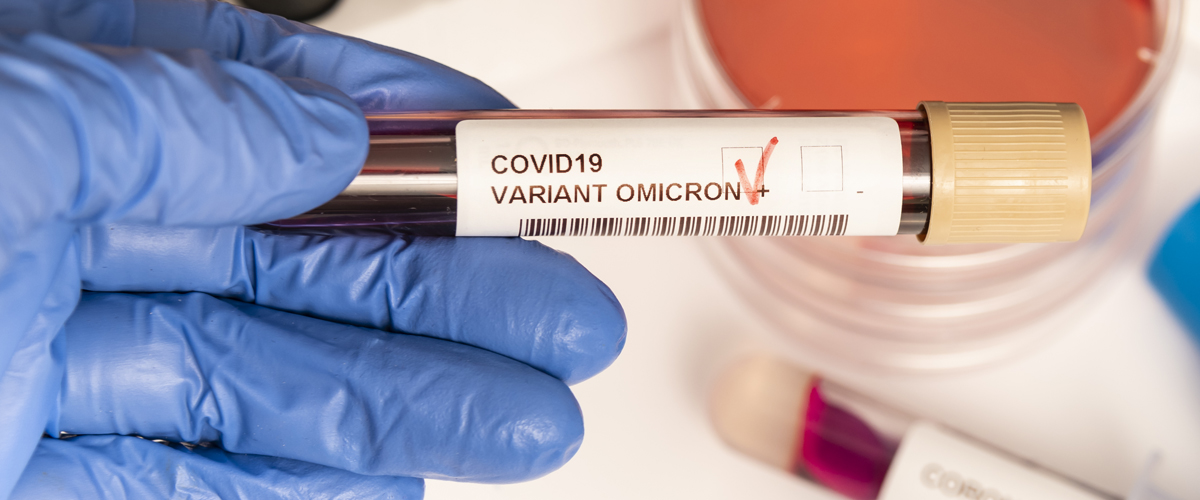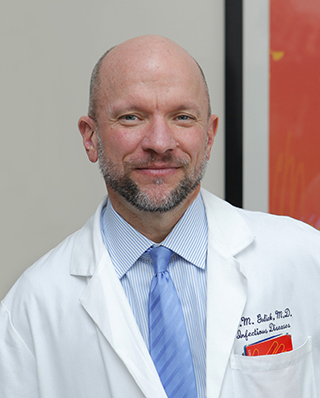Omicron: What We Know So Far
Dr. Roy Gulick, chief of the Division of Infectious Diseases at NewYork-Presbyterian/Weill Cornell Medical Center, shares the latest information about the new coronavirus variant.

Omicron — the latest coronavirus variant to be labeled a “variant of concern” — has been spreading rapidly in the United States and dozens of countries around the world. In response, the Centers for Disease Control and Prevention (CDC) has strengthened its recommendations on boosters to encourage those 16 years and older to get a booster shot.
The Omicron variant is now the most dominant version of the coronavirus in the U.S., the CDC recently reported.
“This is a variant that is very new and has some properties that are of concern,” says Dr. Roy Gulick, chief of the Division of Infectious Diseases at NewYork-Presbyterian/Weill Cornell Medical Center and Weill Cornell Medicine. “There is a lot we still don’t know yet, and information is evolving rapidly.”
Health Matters spoke with Dr. Gulick, the Rochelle Belfer Professor in Medicine at Weill Cornell Medicine, about Omicron and what we do know so far.
When and where did Omicron emerge?
The Omicron variant, named for the 15th letter in the Greek alphabet, was first discovered on November 23 in South Africa. The very next day, the South Africans reported the new variant to the World Health Organization (WHO), and on November 26, the WHO designated Omicron a variant of concern. Since then, it has been detected in more than 95 countries.
What do we know so far about Omicron?
It’s a type of SARS-CoV-2, the virus that causes COVID-19. The symptoms of COVID caused by Omicron appear similar to the symptoms caused by the other variants. There are preliminary data that raise concern that it appears to spread 2-4 times more rapidly than previous variants.

Dr. Roy Gulick
The first case in the United States was detected on December 1. What can we expect now that it is surging in the U.S.?
The first case of Omicron in the U.S. was identified in San Francisco in a symptomatic traveler from South Africa. It’s not surprising that more cases were quickly identified and that it is rapidly spreading in the U.S. This reinforces current recommendations to get vaccinated, and that all who are eligible receive a booster dose of vaccine and continue to wear a face mask and practice social distancing and hand-washing.
Dr. Anthony Fauci, the nation’s top infectious disease expert, has said that this variant has a “very large constellation of mutations.” What does that mean?
The spike protein — the protein that the virus uses to bind to human cells and that is important for provoking the vaccine responses — for the Omicron variant has 38 mutations, or changes, from the original SARS-CoV-2. That’s a lot of mutations. For comparison, the delta variant only has nine mutations in the spike protein. Scientists have also discovered that this Omicron variant has 10 mutations in the part of the spike protein that the virus uses to attach to the cell that it’s going to infect. Again, for comparison, delta has two.
How transmissible is it?
Preliminary studies suggest that Omicron appears to be 2-4 times more transmissible but it needs to be studied further. One thing that we know for certain is that Omicron variant infections appear to be emerging rapidly in South Africa, parts of Europe, the New York City metropolitan area, and some other parts of the country at an increased rate compared to some of the other variants that we’ve seen before, including delta. So that raises concerns that this variant spreads more easily than the present variants that are out there.
Does it cause more severe illness or hospitalizations?
We do not know that yet. Early signs from South Africa and Europe suggest that Omicron may cause less severe disease and hospitalizations but it’s too early to make any conclusions and more data is needed over a longer period of time and in different populations and countries. As we learn and discover more about Omicron, we will know more.
Do we have reason to believe that the vaccine will work against this variant?
The short answer is that while the vaccine alone appears to have less ability to protect because immune responses decrease over time, the vaccine followed by a booster appears to offer strong protection. There’s a lot of research going on right now. The one thing to remember about the vaccines is that they provoke the immune system to make lots of different antibodies and cellular responses to counteract the virus. So the vaccines with a booster will likely still help people in terms of not getting severe COVID-19 disease and make the illness milder, even if the Omicron variant is spread more easily in the community. New data show that boosters are likely to provide a substantial increase in protection against Omicron. It reinforces the fact that people need to get vaccinated and boosted.
Is there a higher risk of reinfection?
There’s some preliminary evidence of an increased rate of reinfection in people who have had COVID before, compared to other variants, but we need more data to confirm that.
What should we be doing to protect ourselves?
We need to stay vigilant — people need to continue to wear masks, socially distance, and wash their hands. While this will be challenging in the winter months and over the holidays, this is not the time to let our guard down.
And most importantly, people need to get vaccinated and a booster shot.
Should people wait to see if the boosters will be updated to account for Omicron, or should they get boosted now?
They should not wait to get a booster. If it’s been more than six months with either Pfizer or Moderna, or two months with Johnson & Johnson, then they need to get a booster now. And by the way, they should get their flu shot too.
Anything else we should know?
Ultimately, we need to be careful and cautious, but people should not panic — we expect to learn much more in the coming days and weeks.
Additional Resources
Stay updated on COVID-19.
Roy M. Gulick, M.D., is chief of the Division of Infectious Diseases at NewYork-Presbyterian/Weill Cornell Medical Center and Weill Cornell Medicine and Rochelle Belfer Professor in Medicine at Weill Cornell Medicine. Board-certified in internal medicine and infectious diseases, Dr. Gulick conducts clinical research, sees patients with infectious diseases, and teaches medicine. His primary research involves designing, conducting, and analyzing clinical trials to refine strategies for HIV treatment and prevention, and more recently COVID-19. He serves as principal investigator of the Weill Cornell HIV Clinical Trials Unit of the AIDS Clinical Trials Group and the HIV Prevention Trials Network, sponsored by the National Institutes of Health, and as co-chair of the U.S. National Institutes of Health COVID-19 Treatment Guidelines.
